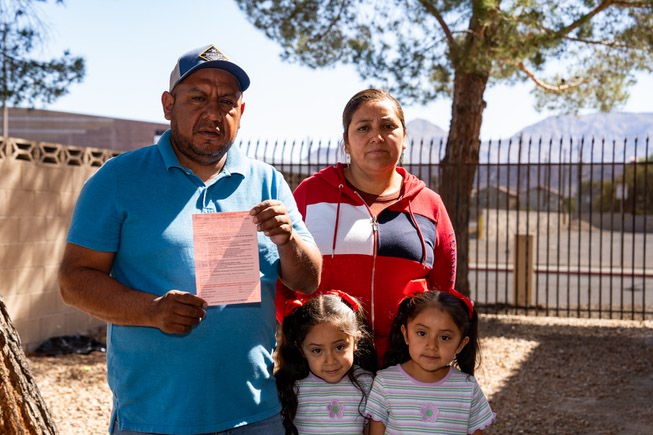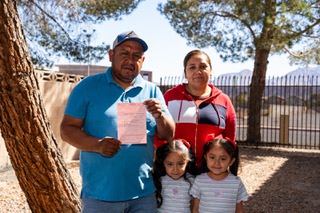
Street vendors Humberto and Mariana are pictured with their twin daughters near a grade school at Riata Way and Copper Road, April 10, 2022. An agent from the Clark County Department of Business Licensing served the couple with a citation for conducting business on the public right of way, marking the first time they’ve been cited in nearly a decade of doing business in mostly the same location, they said.
Sunday, April 14, 2024 | 2 a.m.
Humberto and Mariana have been selling Latino-inspired street snacks for the past nine years in an east Las Vegas neighborhood near an elementary school off Riata Way and Copper Road.
The married couple say it’s the family’s lone source of income to support their twin daughters. The Sun agreed not to publish their last name.
Humberto and Mariana are used to serving mayonnaise-covered elotes and mangonadas drinks to customers passing by, but Tuesday they had an unexpected customer. A man approached their stand asking to purchase a snack and then served them with a pink piece of paper with “NOTICE OF VIOLATION” in bright red ink at the top of the slip, Mariana said.
An agent from the Clark County Department of Business Licensing served the couple with a citation for conducting business on the public right of way, marking the first time they’ve been cited in nearly a decade of doing business in mostly the same location, they said. The violation carries a fine of $250 to $1,000 for the first-time violators.
The agent was stern with the couple, saying if they continued to operate in that location they would again be cited and could face jail time.
More regulations could be coming for street vendors, drawing frustration from sellers who fear they’re being pushed out of the city and being unfairly targeted. Most of the street vendors are immigrants.
The Clark County Commission on Tuesday will consider a proposal to tighten regulations on the industry to further limit where they could sell and establish an application process for licensing. Currently, there’s no way for street vendors selling in unincorporated areas of Clark County to be licensed.
The proposal would complement an initial ordinance passed in October 2023 prohibiting sellers from setting up shop within 1,500 feet of a resort or event facility with a seating capacity of at least 20,000, such as Allegiant Stadium and T-Mobile Arena.
The new proposal would additionally restrict street vendors from selling within 500 feet of a pedestrian mall or entertainment district. Street vendors also couldn’t sell at a community center unless contracted by the county, or “the extreme outside perimeter” of any school property or child care facility.
“Regardless of what the vote is, (we’re) going to go out into the community to sell regardless because that is the only way to provide food for the table,” Mariana said in Spanish through a translator. “The departments involved are not doing their best to bring (street vendors) into the discussion; they’re not making it accessible.”
The county’s proposal is in response to the 2023 Nevada Legislature passage of Senate Bill 92, which created requirements for licensing and regulation of street vendors by individual jurisdictions.
Proposal draws criticism
Under the proposed ordinance, street vendors would need a business license, permits from the Southern Nevada Health District and the Nevada Department of Taxation, and proof of liability insurance. They would also have to detail to the county the products they are selling and structure from which they are selling.
The liability insurance requirement could exclude many street vendors, some of whom are immigrants with limited means, say advocates from Make the Road Nevada, a nonprofit agency that works to elevate the power of working-class immigrant communities. Make the Road Nevada has taken the lead in backing street vendors since state lawmakers took up the issue.
“These provisions not only threaten the economic viability of our street vendors but also hinder their ability to operate effectively and sustainably within our community,” Jennifer Fleischmann Willoughby, development director at Make the Road Nevada and wife of a small-business owner, said in a letter to the county. “It is crucial that any regulations governing sidewalk vending strike a delicate balance between ensuring public safety and supporting the economic well-being of our vendors.”
The proposal also calls for street vendors to not operate within 150 feet of another vendor, licensed food establishment during its business hours, a business with a nonrestricted gaming license, an emergency response vehicle entrance path or a sidewalk or street closure.
Additionally, street vendors would be barred from selling within 15 feet of an intersection, loading zone, parking space, access ramp designed for people with disabilities, public restroom, bus stop, driveway, alleyway, crosswalk, building entrance or exit, fire escape, emergency exit, fire hydrant, fire lane or fire department connection.
The county’s proposed ordinance would limit hours of operation as well, allowing street vendors to sell between 8 a.m. and 9 p.m. unless contracted by another business or individual.
Violators could face a civil fine up to $500. Violations outside a residential zone could result in a misdemeanor charge with a sentence of up to six months in jail.
About 244 mobile food vendors and a “countless number of food establishments” could be affected by licensing street vendors operating in unincorporated areas of Clark County, the county estimated.
Before passing the first street vending ordinance in 2023, the county held multiple town hall meetings with the commissioners and street vendors to discuss the proposal and answer questions. The business license department also set up a webpage with information for sidewalk vendors.
That’s not the case this time, Make A Road advocates say.
Carmen Parra, a member of Make the Road Nevada, said many of the street vendors she has met in the community were largely unaware of either the 2023 ordinance or the proposed new ordinance. Parra says she worries that, if the county adopts the proposed ordinance, street vendors will be pushed out of county limits and/or accosted more by police and punished.
Support for licensing
Not everyone has an issue with the county’s proposed rules.
The Nevada Resort Association, Henderson Chamber of Commerce and Vegas Chamber sent letters to the county commission pledging their support. Many of the letters addressed protecting licensed businesses and the importance of street vendors abiding by the same standards as brick-and-mortar businesses, especially when it comes to food handling.
Virginia Valentine, president and CEO of the Nevada Resort Association, said street vendors — especially in high-traffic pedestrian areas like the Strip — caused congestion on sidewalks. She supports “strong enforcement measures” to keep walking paths clear.
“Las Vegas’ reputation as a top travel destination depends on providing a safe environment for our employees and guests,” Valentine wrote. “We believe this (ordinance) is essential to the safety of resort corridor workers and visitors and to creating parity among businesses, thereby safeguarding county taxpayers relative to equal protection claims.”
Street vendors themselves are not against having regulations, especially since they open a path for business licensure, Parra said. The problem is taking away the parks, churches and schools where many of these street vendors have set up for years and built communities with their customers.
The proposal, they say, would deliver a crushing blow economically and prevent them from providing for their families.
Street vendors and their allies ahead of Tuesday’s meeting are urging commissioners to “open their hearts” and table the vote to provide more time for street vendors to share their opinions, which could possibly lead to rule changes.
But Mariana and Humberto are sure the street vendor community will continue to sell even if the ordinance is adopted. It’s all that some can do to survive, she emphasized.
“Regardless of what the vote is, if these restrictions take them out of the parks and churches and are very restrictive like that, there’s not going to be a point for them to apply for these licenses, and they’re just gonna continue doing what they’ve been doing this whole time,” Mariana said through a translator. “Why is it that there are states like Arizona and California — they have already implemented street vending license proposal laws that work with the street vending community and make it accessible, and here in Nevada, it’s not that case. They should view these other states as an example.”
[email protected] / 702-948-7854 / @gracedarocha

